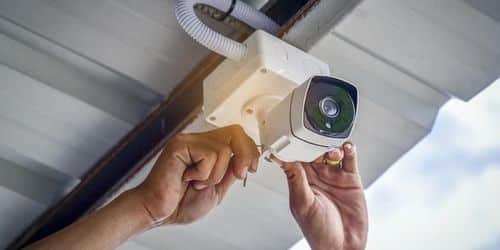Commercial-grade security cameras are a necessity and highly recommended for any business site, from huge corporations to tiny businesses, to protect employees first and foremost, as well as other factors like company property, confidential data, and precious commodities. It is good to put security cameras for your business or anywhere for security reasons, incidents or future purposes. This article talks about the best wireless IP security cameras for business and where to do the installation.
Overview
A business security camera is a video recording device that captures footage of your business and property that you can view from anywhere using an internet connection on a smartphone, tablet, or computer. Most corporate security cameras are motion-activated and will record as well as send you an alert if they detect motion. Some cameras can record continuously, which is known as continuous video recording (CVR).
A security camera is a fantastic tool for delivering corporate security and the peace of mind that comes with it. “In summary, businesses like to be able to monitor the situation, whether it’s knowing about specific incidents or their products and the surrounding work environment.” Below is an example of a corporate security camera;
- The Swann Enforcer Wired Smart Security Video Surveillance System is the best business security camera with night vision.
The Swann Enforcer security surveillance system, which includes two dome cameras and six bullet cameras with infrared night vision, can record footage from up to 130 feet away at night. In addition, the six bullet cameras included offer up to 32 feet of full-color night vision for HD recording in low-light circumstances. Users have access to one TB of video storage on the machine, but this offer also includes free cloud storage. Users can install the software on their smartphones to ensure that their business is always protected.
Buying Guide for Commercial Security Cameras
Here are things to consider when buying a security camera for your business below;
- Audio
- Detecting Motion
- Resolution of Video
- Storage
- Remote Control
- Connectivity
IP Security Cameras for Business
An IP camera, often known as an Internet protocol camera, is a form of digital security camera that collects and transmits video footage over an IP network. They are frequently used in surveillance. In contrast to analog closed-circuit television cameras (CCTV), IP cameras simply require a local network. Like phones and computers, IP cameras connect to a network in the same way.
How Do Networked IP Cameras Function?
To transmit video to a digital video recorder, analog and analog-over-digital security cameras require a coaxial video cable (DVR). Business IP security cameras, on the other hand, can broadcast video over a wireless link. IP cameras, in particular, link to a network video recorder (NVR) through Wi-Fi, Ethernet cable, or USB.
Business IP security cameras record video in high definition, with resolutions as high as 16 megapixels depending on the camera model. Each IP camera includes a processing chip that compresses video material as it records. What does this mean? The more data each video capture contains, the higher the camera resolution. High-resolution photos need more storage space and data transmission bandwidth than lower-quality photographs. To avoid utilizing too much bandwidth when transmitting HD photos across a network, business IP security cameras must compress or shrink the files. Modern compression standards, like h.264 and MPEG-4, ensure that there is no or just a minor reduction in frame rate and resolution when the footage reaches your phone or computer. Below is an example of an IP security camera for business;
- The ANNKE WS200 Security Camera Systems are the best IP security cameras for business firms.
The ANNKE security camera system, which includes both NVR and network storage, enables small businesses to back up their footage while still seeing HD video feeds from anywhere. The four IP cameras come with 5 dB antennas, and the NVR has a seven dB antenna to ensure smooth internet connectivity.
It also includes customized motion detection for more precise alerts. If your wireless network has a limited range, you can connect by using a network cable. For these situations, the kit contains an Ethernet cable.
Choosing a Security Camera System:
You have to;
#1. Determine Your Surveillance Requirements
Examine your property and make a list of all indoor and outdoor points that should be accessible, such as corridors, doorways, the perimeter, and access points. This will assist you in determining how many and what type of cameras you will require.
#2. Specify the System Requirements
Make a list of precise feature requirements. You may have various camera requirements for different places. For example, night vision distance may be important for outdoor surveillance, whereas a wide viewing angle is preferable for doorways.
#3. Conduct Research and Comparison Shopping
It will be much easier to compare your best possibilities if you know how many cameras you require, their specifications, and the type of recording system you require. Key features to consider include:
- Preinstalled hard drive and storage capacity expansion options.
- The number of channels and camera types supported.
- Camera specifications, such as resolution, detecting capabilities, night vision, viewing angle, and robustness.
- Resolution of the camera vs. resolution of the recording
- You can also adjust the recording resolution to increase the number of hours of footage that can be of record before overwriting.
- Capabilities for remote viewing and management
- Interface with apps such as Dropbox, Google, or Amazon Alexa.
- Notifications and alerts
Best Security Cameras for Business
Criminals frequently target small and medium-sized enterprises. They typically possess precious items, cash, and a slew of weaknesses that can be exploited for evil purposes. The following are the top security cameras for business;
#1. Arlo
Arlo’s wonderfully designed battery-operated cameras are ideal for small-business owner who does not want to get too far ahead of themselves when it comes to setting up and operating their security camera network. Arlo’s no-nonsense, friendly demeanor is refreshing in a sector that might be overburdened with unnecessary frills.
#2. SimpliSafe
This small camera is discreet, can be outfitted with a “wetsuit” for outside use (or you can choose the beefier SimpliSafe Outdoor Camera), and can be mounted wherever the second set of eyes is required. Meanwhile, the feed is delivered to your smartphone and, for a modest cost, can be stored off-site in the cloud.
SimpliSafe, like Ring, provides additional devices to help keep your business secure. However, one of the most intriguing aspects is that they provide professional monitoring for as little as a dollar each day. SimpliSafe is also a wonderful choice if you are concerned about security yet have a limited budget. But, once again, this is a really simple method.
#3. Blink
They have low upfront fees, are designed to be discrete, and their storage plans are more than reasonable. Bink cameras do not record indefinitely; instead, they require motion to activate from a power-saving mode. The good news is that the AA batteries that power your little unobtrusive camera will last approximately two years, but the bad news is that you may miss the first seconds of action. This could be a deal-breaker for some applications, but it shouldn’t be an issue for business owners trying to keep an eye on things.
#4. Ring
Rings’ business offerings include Ring Spotlight Cams and Ring Stick Up Cams. Both are available in wired and battery-powered versions, with a slew of capabilities such as high-definition night vision and 1080p resolution, and are available in black or white. Ring also offers a battery-powered spotlight cam to put some light on the situation if you’re searching for deterrence.
Ring provides a plethora of peripheral equipment options, including alarm systems, panic buttons, and flood and freeze sensors.
#5. Lorex
For starters, their versatility and features are exceptional. Whatever the application, Lorex appears to have a camera that will meet the requirements. From deterrence systems to high-definition color night vision to smart alert capabilities and pan-tilt-and-zoom technology, Lorex has the cameras you need to keep your business safe.
Lorex recognizes that having so many options might be daunting. Are you unsure of what you require? It’s not a problem. Lorex provides expert consultations to business owners, which is a beneficial service for those who do not fully grasp their needs or the solutions available to them.
Can a Business Have Security Cameras?
According to the laws of the United States, the use of security cameras and other forms of video surveillance in the workplace is perfectly acceptable. However, this comes with an important caveat: in order for an organization to use security cameras in the workplace, they must have valid grounds related to their business. This is a criterion that can easily be met by the vast majority of enterprises.
What is the Best Security Camera System for Business?
Bringing security monitoring into your small business may be accomplished in the easiest and most cost-efficient way possible with the help of business security camera systems. Products offered by Oculur, LTS Security, Vivotek, and Hikvision for use in commercial and business environments. Please take the time to read our post for a tutorial on installing security cameras in small companies.
How Do I Choose the Best Business Surveillance System?
You will want to give careful consideration to a variety of aspects, including pricing, video quality, durability, monitoring options, storage options, the convenience of installation, and additional features, when searching for the very best business surveillance system to meet your needs. In the end, however, you should make your decision on the particulars of your company and the particular camera that will assist you in improving both your security and your productivity.
Wireless Security Cameras for Business
Wireless security cameras transmit video through a radio frequency (RF) transmitter for business firms. The video is delivered to a recipient via a built-in storage device or cloud storage. You’ll have an easy way to access all of your images or video clips via your monitor or receiver.
The term “wireless” refers to the method by which a camera communicates, not how it is powered. Wireless cameras communicate using Wi-Fi, whereas wired cameras transmit footage via wires. Wireless cameras can be powered by alternating current (AC) (such as a standard household outlet) or batteries. A wireless camera becomes a wire-free camera when powered by batteries.
Wireless home or business security cameras typically save footage to a cloud server, which you may access from anywhere. Some cameras can also record video to local media, such as a microSD card. Wireless security cameras for business firms are popular because they are simple to set up and view using a smartphone or computer. It is also for homes too.
Wireless business or home security cameras typically record when motion or sound is detected, although some can be configured to record continuously if plugged into power. Meanwhile, they capture high-resolution video and, if equipped with night vision, can record at night. However, for more features click here to view a list of wireless cameras.
Security Cameras for Business Installation
The security cameras’ business installation is beneficial because they have a preventative impact on people who are aware that they are being watched, making them more focused on their work and less likely to engage in undesirable conduct for fear of being caught red-handed. However, in order to receive the best results from your camera, you must position it in specific strategic locations. The following is the best installation of security cameras for business firms below.
- One installation for business security cameras is the entrances and exits.
- Places of Work
- Office Supplies and Storage (s)
- Area of Welcome
- Warehouses
- Docks for loading
- Dumpsters and other isolated spots are also good installation sites for business security cameras.
- Points of Contact with Customers
How Much Do Security Cameras for Businesses Cost?
For security gear, a company might expect to invest anything from $1,000 to $10,000 or more. A small to medium-sized business with one location should expect to pay roughly $3,000. The hardware for a security system might cost anywhere between $1,000 and $3,000. Depending on the size of the company, installation prices range from $200 to $550. Monthly monitoring fees can range from $40 to $150, depending on the size and plan.
Which Is the Best Security Camera for the Office?
The TechEase 360° Smart Home Office WiFi Camera is the finest option.
If you want to get an all-weather camera that can resist rain, heat, and winters, the TechEase 360° smart home office WiFi Camera is the finest CCTV camera for home with recording under INR 3000. It sports a 2 MP camera sensor and full-color HD recording at a spectacular quality of 1080P. It has a night vision range of up to 10 meters or 33 feet and offers 360° monitoring.
Which CCTV Is Best for Business?
The Arlo Pro 3 Spotlight Camera is the overall best.
The Arlo Pro 3 security camera system is among the best on the market. Each camera in the starter pack can capture video in 2K with HDR capability for clear photos. In addition to motion detection, the camera contains an incorporated illumination, which makes recording at night considerably easier.
What Is the Best Commercial CCTV System?
ANNKE WS200 Security System IP Cameras are the best.
What Is the Cost of Installing Four Security Cameras?
A 4-camera home security system costs $500 to $1,600 to install, while an 8-camera video surveillance system costs $1,000 to $2,500 for setup and labor. When purchasing your own security cameras, expert labor prices for setup and installation range from $80 to $200 per camera.
How Long Do Security Cameras Keep Footage?
The solution is usually dictated by policy rather than technological constraints.
The majority of camera footage is held for 30 to 90 days. This applies to hotels, retail businesses, supermarkets, and even construction firms. To meet industry regulatory requirements, banks must preserve security camera footage for up to six months. Some state casino regulations mandate that the data be kept for six months to a year.
What’s the Difference Between Surveillance Cameras and Security Cameras?
Security cameras are made to notify you of specific incidents, whereas surveillance cameras are made to keep an eye on a certain region. You can keep an eye on space using either type of camera. You may have the choice to view events as they unfold in real-time or replay previously captured footage using either one. However, recording footage for subsequent viewing is more frequently done with surveillance cameras. They lack motion sensors, for example, so they can’t warn you if someone is breaking into your place of business. A security camera, on the other hand, typically has to record when anything happens as opposed to continuously.
What Can A1 Security Cameras Do For You?
We have created dozens, if not hundreds of thousands, of commercial camera systems. The specialists at A1 Security Cameras have years of practical experience. When we refer to “hands-on experience,” we mean using a ladder, running cables, testing various security cameras, and creating various security systems for various scenarios. When it comes to security cameras, we are more like Home Depot, to put it simply. We have the knowledge to assist you in choosing between several brands, technologies, and products.
Is Cctv a Good Investment?
You can find a variety of specialized CCTV surveillance cameras on the market nowadays. Depending on the purpose for which the cameras are going to be utilized, you may choose the sort of CCTV camera that will work best for your residential or commercial property. As a result, considering all of these factors, it is prudent to put money into CCTV surveillance systems.
Do Security Cameras Use a Lot of Data?
The “steady-state” data consumption of some security cameras can be as little as 5 kilobits per second, while the data consumption of others can reach 6 Mbps or even higher. The bandwidth consumption of an IP cloud camera is typically between 1 and 2 Mbps on average (assuming 1080p using H. 264 codec at 6-10fps). In steady-state conditions, the data transfer rate of a hybrid cloud camera is often much lower, ranging from 5 to 50 Kbps.
Conclusion
In order to know what is happening around your business, you will need a good security camera to record it. You can access it anywhere and monitor your organization even though you are not around. Security cameras can be put anywhere, even in homes, to monitor their surroundings. This article teaches about the “security cameras for business.”
SECURITY CAMERAS FOR BUSINESS FAQs
Why are security cameras important for your business?
Security cameras are crucial for workplace safety. They assist you in monitoring conditions and identifying potential workplace dangers or actions that may lead to workplace injuries.
What do security cameras need?
To have a completely functional surveillance system, you will require the following:
- A sufficient number of cameras.
- Storage on a hard drive for video content.
- Power and wires that are adequate.
- Software and/or hardware for video recording that is appropriate.
- To view the footage, you’ll need at least one type of video display.
How do smart security cameras work?
Smart cameras (security cameras and baby monitors that track activities in and around your home) typically link to the internet via your home’s Wi-Fi. This means you can see a live camera feed, get alerts while you’re out and about, and occasionally even shoot video.
Related Articles
- 11 Best Business CCTV Systems In 2023 (+ Reviews)
- LAWYER SALARY: Average Salaries By State, Experience & Field of Practice (Updated!)
- BEST OUTDOOR SECURITY CAMERA SYSTEM FOR BUSINESS in 2023
- TOP 10 BUSINESS SECURITY CAMERA SYSTEMS: Reviews (Updated)
- Camera Brands: A Comprehensive List Of The Best Options.






